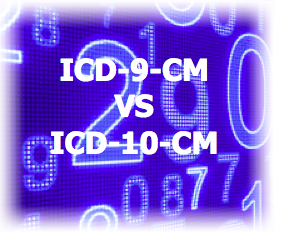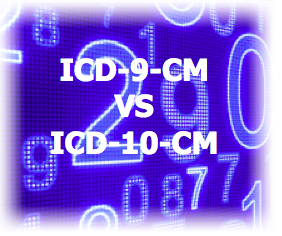 With the upcoming switch to ICD-10, major changes are being made to the way things are being done. To help smooth out the transition, here are the most important differences between ICD-9-CM and ICD-10-CM that you need to know.
With the upcoming switch to ICD-10, major changes are being made to the way things are being done. To help smooth out the transition, here are the most important differences between ICD-9-CM and ICD-10-CM that you need to know.
Specific Information
 With the upcoming switch to ICD-10, major changes are being made to the way things are being done. To help smooth out the transition, here are the most important differences between ICD-9-CM and ICD-10-CM that you need to know.
With the upcoming switch to ICD-10, major changes are being made to the way things are being done. To help smooth out the transition, here are the most important differences between ICD-9-CM and ICD-10-CM that you need to know.
Specific Information
ICD-9 has been plagued by a lack of specifics, such as similar injuries on opposite limbs having the same code. This reduces effectiveness and has caused confusion on many different levels. ICD-10 will offer a greater degree of specific information in areas such as right versus left, initial or subsequent encounter, and other relevant clinical information. The greater degree of specific information is utilized with a number of different methods, many of which are covered below.
Number of Codes
As part of the effort to provide more information, ICD-10 will have roughly 68,000 available codes (with flexibility for adding new ones) in comparison to ICD-9’s 13,000 codes and limited space for additions. Codes may be somewhat different than before, so coders will need to understand how to effectively search for codes under the new system.
Length of Code
ICD-10 uses codes that are longer (in some cases) than those of ICD-9, following a basic structure.
- Digits 1-3 will now refer to the category
- Digit 1 is always alphabetic
- Digits 2-3 are always numeric
- Digits 4-6 will cover clinical details such as severity, etiology, and anatomic site (among others), and are either alphabetic or numeric
- Digit 7 will serve as an extension when necessary, and will be either alphabetic or numeric
Combination Codes
ICD-10 supports further use of combination codes that can be used to classify such things as multiple diagnoses or a diagnosis with a complication. These are expressed as single codes, reducing the number of codes that need to be made while still providing information that is as specific as possible.
Use of Alphabetic Codes
ICD-9 only permitted numeric codes. In contrast, ICD-10 will make significant use of alphabet codes as part of its work to be more specific. The characters will not be case sensitive, and both alphabetic and numeric codes are intended to retain identical meanings as much as possible throughout code sets and procedure sections.
The additional characters allow for information such as listing the body system, root operation, body part, approach, device, and any necessary qualifier all within one code for a surgical procedure. Use of this may vary somewhat by section.
Relevance to Modern Technology
ICD-9 is widely considered to be based on outdated technology, with codes unable to reflect the use of new equipment. ICD-10 offers far more integration with modern technology, with an emphasis on devices that are actually being used for various procedures. The additional spaces available are partly designed to allow for new technology to be seamlessly integrated into codes, which means fewer concerns about the ability to accurately report information as time goes on.
In Conclusion
ICD-10 is not a simple update to ICD-9. The structural changes throughout the entire coding system are very significant, and the increased level of complexity requires coders to be even more thoroughly trained than before. However, it is possible to prepare for the changes by remembering a few simple guidelines:
- Train early- The more familiar your staff are with ICD-10, the better. While currently scheduled to begin Oct. 1, 2014, beginning the training now is not a bad idea.
- Understand the ICD-10- The structural changes require a change in the way people think about coding, and understanding it will help to break current coding habits. Medical professionals used to reporting things a certain way so they can be coded may need to change what they say in order to work well with the new system.
- Ask for help- If there is something you or your staff need help with or do not understand, ask for help.
![]()







